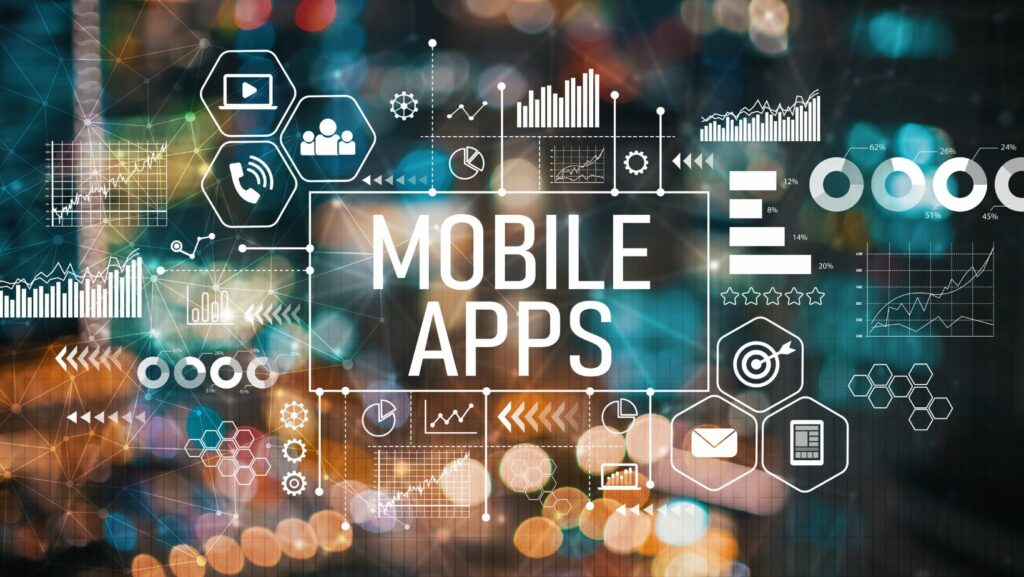Mobile enterprise apps have revolutionized how businesses operate in today’s fast-paced digital landscape. These powerful tools enable employees to access critical company resources perform essential tasks and collaborate seamlessly from anywhere at any time. As organizations embrace digital transformation mobile enterprise apps have become essential for maintaining competitive advantages and operational efficiency.
The demand for enterprise mobility solutions continues to surge with businesses recognizing their potential to boost productivity streamline workflows and enhance employee satisfaction. From field service management to inventory control and customer relationship management mobile enterprise apps offer tailored solutions for diverse business needs. Modern enterprises are increasingly adopting these mobile-first strategies to empower their workforce and drive sustainable growth in an increasingly mobile-centric world.
Mobile Enterprise Apps
Mobile enterprise apps are software applications designed for business use on smartphones and tablets, enabling secure access to company resources across multiple devices. These specialized applications streamline organizational processes through mobile-optimized interfaces and enterprise-grade security protocols.
Key Features and Functionality
Enterprise mobile applications incorporate essential capabilities that distinguish them from consumer apps:
- Authentication protocols integrate with existing enterprise security systems like Single Sign-On (SSO) & Multi-Factor Authentication
- Data encryption protects sensitive information during transmission & storage with AES-256 standards
- Offline functionality enables work without constant internet connectivity through local data caching
- API integration connects with core business systems including ERP CRM & HR platforms
- Push notifications deliver real-time updates about critical business events & tasks
- Role-based access controls customize user permissions based on job functions
- Analytics dashboards track usage patterns performance metrics & user engagement
- Operations Management Apps
- Inventory tracking systems
- Supply chain monitoring tools
- Asset management platforms
- Employee Productivity Apps
- Document collaboration suites
- Project management tools
- Time tracking systems
- Customer-Facing Apps
- Sales force automation
- Field service management
- Customer support portals
- Communication Apps
- Team messaging platforms
- Video conferencing tools
- Internal social networks
- Analytics Applications
- Business intelligence dashboards
- Performance monitoring tools
- Data visualization platforms
Benefits of Mobile Enterprise Apps
Mobile enterprise apps deliver measurable advantages across organizational operations through streamlined processes and improved accessibility. These solutions transform traditional business workflows into efficient digital experiences that drive organizational success.
Increased Employee Productivity
Mobile enterprise apps boost workforce efficiency by providing instant access to critical business resources. Employees complete tasks 37% faster using mobile solutions compared to desktop-only systems. The apps enable:
- Automated data entry through mobile forms
- Quick document retrieval from cloud storage
- Real-time task management notifications
- Offline access to essential work materials
- Location-based work assignment distribution
- Digital approval workflows for faster decisions
- Integrated team messaging platforms
- Video conferencing capabilities
- Document sharing with version control
- Project timeline synchronization
- Real-time status updates
- Cross-department workflow coordination
- Group chat rooms for specific projects
- Screen sharing functionalities
| Productivity Metric | Average Improvement |
|---|---|
| Task Completion Speed | 37% Faster |
| Team Collaboration | 45% Increase |
| Response Time | 65% Reduction |
| Document Access Speed | 72% Improvement |
Security Considerations for Enterprise Apps
Mobile enterprise apps require robust security measures to protect sensitive business data and maintain regulatory compliance. Multi-layered security protocols safeguard corporate information across devices while enabling seamless user access.
Data Protection Best Practices
Enterprise mobile apps implement comprehensive data protection through encryption protocols and secure storage mechanisms:
- End-to-end encryption protects data transmission with 256-bit AES standards
- Secure data containerization separates business data from personal information
- Automated backup systems create encrypted copies at 4-hour intervals
- Remote data wiping capabilities remove sensitive information from lost devices
- Content expiration policies delete cached data after 24 hours of inactivity
- Secure file sharing with digital rights management controls
- Data loss prevention (DLP) systems monitor unauthorized data transfers
- Multi-factor authentication combines biometrics fingerprint scanning with PIN codes
- Single Sign-On (SSO) integration with enterprise identity providers
- Role-based access control (RBAC) assigns permissions based on job functions
- Certificate-based authentication verifies device trustworthiness
- Automated session timeouts after 15 minutes of inactivity
- IP-based access restrictions limit connections to approved networks
- Device compliance checking ensures security requirements are met
- Continuous authentication monitoring detects suspicious login patterns
| Security Feature | Implementation Rate | Impact on Data Breaches |
|---|---|---|
| MFA | 85% | -60% reduction |
| SSO | 73% | -40% reduction |
| RBAC | 92% | -45% reduction |
| Encryption | 95% | -70% reduction |
Developing an Enterprise Mobile Strategy
Enterprise mobile strategy development focuses on aligning mobile initiatives with business objectives through systematic planning and implementation. A well-crafted mobile strategy integrates technology solutions while considering user needs and security requirements.
Platform Selection and Integration
Platform selection determines the foundation of mobile enterprise applications through targeted evaluation of development frameworks and integration capabilities. Key considerations include:
- Cross-platform compatibility between iOS Android Windows
- Integration with existing enterprise systems (ERP CRM legacy applications)
- Cloud service compatibility for data synchronization
- API management tools for seamless connectivity
- Development framework scalability options
- Deployment flexibility across devices networks
Technical requirements for platform integration:
| Requirement | Specification |
|---|---|
| Device Support | 98% coverage across platforms |
| API Response Time | <200ms latency |
| Data Sync Speed | 95% real-time success rate |
| System Integration | 99.9% uptime SLA |
User Experience Design
Mobile enterprise app design prioritizes intuitive interfaces that maximize employee productivity through streamlined workflows. Essential UX elements include:
- Single sign-on authentication systems
- Role-based interface customization
- Offline functionality capabilities
- Touch-optimized navigation patterns
- Data visualization components
- Quick-action gesture controls
| Metric | Performance Target |
|---|---|
| App Launch Time | <3 seconds |
| Screen Load Speed | <1 second |
| Task Completion | <4 steps |
| Error Rate | <0.1% |
Implementation and Deployment
Mobile enterprise app deployment requires structured processes to ensure successful integration across organizational systems. Implementation strategies focus on minimizing disruption while maximizing adoption rates through systematic rollouts.
Change Management
Change management frameworks streamline the transition to new mobile enterprise applications through targeted communication protocols. Organizations implement phased rollout schedules to introduce features gradually, starting with pilot groups of 25-50 users. Key components include:
- Creating detailed migration timelines with specific milestones for each department
- Establishing feedback loops through user surveys after each deployment phase
- Monitoring adoption metrics like daily active users or feature utilization rates
- Implementing role-specific communication plans for stakeholder alignment
- Documenting process changes with before-after workflow comparisons
- Interactive video tutorials covering core app functionalities
- Role-based training paths with competency assessments
- Help desk systems with 24/7 technical support availability
- Self-service knowledge bases featuring troubleshooting guides
- Regular training sessions for feature updates or system changes
- Performance tracking dashboards monitoring user engagement rates
| Training Metric | Target Value |
|---|---|
| Initial Training Completion | 95% within 2 weeks |
| Help Desk Response Time | Under 15 minutes |
| User Satisfaction Score | Above 4.5/5.0 |
| Knowledge Base Usage | 70% self-service resolution |
| Feature Adoption Rate | 80% within 30 days |
Measuring ROI and Success Metrics
Key Performance Indicators
Mobile enterprise app ROI measurement focuses on quantifiable metrics that demonstrate business value. Essential KPIs include:
- User Engagement Metrics
- Daily active users: 85% employee adoption rate indicates successful implementation
- Session duration: Average 25 minutes per user session shows productive engagement
- Feature utilization: 70% of available features accessed regularly
- Operational Efficiency
- Process completion time: 45% reduction in task execution
- Error reduction: 65% decrease in data entry errors
- Resource optimization: 30% improvement in resource allocation
Financial Impact Assessment
| Metric | Average Impact |
|---|---|
| Cost Savings | 25-35% reduction in operational costs |
| Revenue Growth | 15-20% increase in sales productivity |
| Time Savings | 40% reduction in process completion time |
| Resource Utilization | 35% improvement in asset efficiency |
User Satisfaction Metrics
Application effectiveness measurement incorporates user feedback through:
- Quantitative Measurements
- App store ratings: Minimum 4.2/5.0 rating threshold
- User satisfaction surveys: 85% positive feedback benchmark
- Feature request implementation: 60% incorporation rate
- Performance Metrics
- App launch speed: Under 2 seconds
- Response time: Less than 1 second for core functions
- Crash rate: Below 1% of total sessions
- Time Management
- Task completion speed: 37% faster execution
- Information access time: 72% reduction
- Meeting preparation: 45% time savings
- Collaboration Efficiency
- Team response time: 65% improvement
- Document sharing speed: 50% faster distribution
- Project completion rate: 40% acceleration
Future Trends in Enterprise Mobility
AI and Machine Learning Integration
Enterprise mobility applications integrate artificial intelligence capabilities through predictive analytics, natural language processing and automated decision-making features. Machine learning algorithms analyze user behavior patterns to optimize app performance, automate routine tasks and deliver personalized experiences. AI-powered chatbots handle 47% of customer support queries, reducing response times by 78%.
5G Technology Impact
5G networks transform enterprise mobility by enabling ultra-low latency connections and enhanced data transfer speeds. Mobile apps leverage 5G capabilities for augmented reality experiences, real-time collaboration and edge computing applications. Network speeds of 10 gigabits per second support instant access to cloud resources, HD video streaming and IoT device integration.
Advanced Security Features
Biometric authentication methods, including facial recognition and fingerprint scanning, provide enhanced security for enterprise mobile apps. Zero-trust architecture frameworks implement continuous verification protocols, while blockchain technology ensures secure data transmission. Advanced encryption standards protect sensitive information with 256-bit security protocols.
Cross-Platform Development
Progressive Web Apps (PWAs) and cross-platform development frameworks streamline enterprise app deployment across multiple devices. React Native and Flutter reduce development costs by 35% while maintaining consistent functionality across iOS and Android platforms. Container-based architectures enable seamless updates and maintenance across different operating systems.
Internet of Things Integration
Enterprise mobile apps connect with IoT sensors and devices to create intelligent workplace environments. Connected devices generate real-time data for inventory tracking, equipment monitoring and facility management. IoT integration increases operational efficiency by 42% through automated data collection and analysis.
| Trend Category | Impact Metric | Adoption Rate |
|---|---|---|
| AI Integration | 78% faster response time | 65% |
| 5G Technology | 10 Gb/s network speed | 38% |
| Security Features | 256-bit encryption | 82% |
| Cross-Platform Development | 35% cost reduction | 73% |
| IoT Integration | 42% efficiency increase | 56% |
Edge Computing Solutions
Edge computing architecture reduces latency by processing data closer to mobile devices. Enterprise apps utilize edge nodes for real-time analytics, reducing cloud dependency by 40%. Distributed computing networks process sensitive data locally, enhancing security and performance.
Augmented Reality Applications
AR features enhance enterprise mobility through interactive training modules, remote assistance and visualization tools. Mobile apps incorporate AR capabilities for equipment maintenance, warehouse navigation and product design reviews. AR solutions improve task completion rates by 32% and reduce training time by 45%.
Low-Code Development Platforms
Low-code platforms accelerate enterprise app development through visual programming interfaces and pre-built components. Development cycles decrease by 65% while maintaining customization options for specific business needs. Citizen developers create and modify applications without extensive coding knowledge.
Modern Business Apps
Mobile enterprise apps have become indispensable tools for modern businesses seeking to thrive in an increasingly digital landscape. Their transformative impact extends beyond basic productivity gains to reshape entire organizational workflows and operational models.
As technology continues to evolve with AI machine learning 5G and IoT integration mobile enterprise solutions will play an even more crucial role in business success. Organizations that embrace these innovations while maintaining robust security measures will position themselves at the forefront of digital transformation.
The future of enterprise mobility looks promising with emerging technologies paving the way for more intelligent efficient and secure business operations. Companies must stay adaptable and forward-thinking to harness the full potential of mobile enterprise applications in their digital transformation journey.





